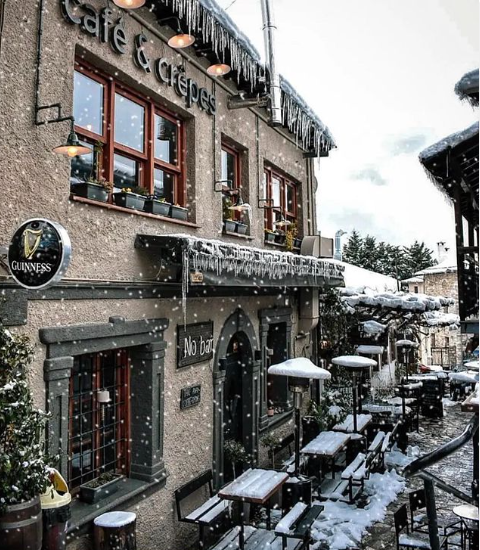Address: 36 Loukianou & Spefsippou, 106 75 Kolonaki, Athens
Telephone: 213 0263656
Image Credit: Stinking Bishop




I can’t believe it’s almost October… Seriously , it’s three months until Christmas! But this week I notice that ‘smell’ of autumn – and I don’t mind one bit. Strikes? Yup. Rain? Yup. Cooler weather? Yup. Am I bothered? Nope.
Turns out I stayed close to home most of the past week. My little Nespresso machine had a good workout – it was a week of catching up with friends, and ‘hangin out’.
At one point, the downstairs buzzer rang. When I opened the door, I was surprised to see my Greek aunt standing in front of me. She had once again driven the hour-long journey from the village, and now stood in front of me with a big smile and her hands full of bags. I said “Wow! What are you doing here?!” She replied as she pushed past me into the kitchen, “Since you don’t come to the village to eat, I brought the food to you! Now, where are your plates?”
We had a really nice meal together, chatted about this or that, (she!) washed the dishes (after literally pushing me out of the kitchen), and off she went…
This is a true story. It really made my day – and I know it really made her day too. Was nice to catch up with everyone this week...
P.S. Uninvited guests with food are welcome, anytime. ;)
Until next week,
Jack
In this weekly space, keep up with ‘Jack’ as he navigates daily life in Athens… Anecdotes, stories, hits & misses, the good, the bad and, well, the rest…
Named after a smelly British cheese, Stinking Bishop is one of the most unique bars/gastropubs in Athens. Located in the upscale Kolonaki area, Stinking Bishop is mostly frequented by local residents and people who work nearby. Its decoration is warm and welcoming, and its small size accentuates the sense of intimacy–there’s only 3 tables and a long counter so make sure to book your table well in advance.
Expect to try some carefully selected cheeses from Greece, France, Holland and England, delicious cold cuts, as well as a few salads and tasty main courses.
Stinking Bishop offers an extensive wine list of approximately 50 different labels, several of which are also served by the glass. The friendly and courteous staff will help you pair your food with the ideal wine!
Address: 36 Loukianou & Spefsippou, 106 75 Kolonaki, Athens
Telephone: 213 0263656
Image Credit: Stinking Bishop
We may be living in an era where real equality between men and women has yet to be achieved, however a recent research by ICAP showed some positive signs. According to a report from Greek newspaper “Ta Nea”, the number of women working in management positions at Greek companies rose to 21% in 2013 from 19% in 2012, noted the research which is conducted annually by ICAP and published in the “Leading Women in Business”.
The research was presented during an event entitled “High Heels on High Hills” organized by ICAP Group for the second consecutive year. According to ICAP Group’s CEO Nikitas Konstantellos, Greek companies should utilize female staff and establish clear objectives. This year’s event included three thematic sections.
The first section analyzed the best practices followed by three companies in Greece: EMC Hellas, Xerox Hellas and Microsoft Hellas, on facilitating the advancement of women in business.
To read more, please visit greekreporter.com
By Ioanna Zikakou
Skordalia, the Greek garlic dip, belongs to the grand tradition of Mediterranean garlic pastes and like them, it is almost never served alone; instead, it plays an accompanying role to fried fish and seafood or to classics like boiled beets.
While there are as many methods for frying salt cod as there are cooks who fry it, skordalia variations tend to follow a regional vein. I have always been impressed by the wealth of regional expressions when it comes to this simple peasant dish, as well as to the ritual that often goes into its preparation.
Garlic, olive oil, and salt are the constants in all Greek skordalia recipes, but the base, acid, and consistency vary from place to place. Dried bread, boiled potatoes, and nuts, especially almonds, pine nuts or walnuts, may all be used as the base of this pungent specialty, either alone or together with stale bread or potatoes. One recipe, from the Peloponnese, calls for starchy chestnuts. Fresh lemon juice, fish stock or broth, and vinegar are the liquids that help balance the final flavors. At least one version, a traditional recipe of the Asia Minor Greeks, calls for pistachios; the skordalia of Nea Marmara in Halkidiki is made with feta and mint; one delicious, obscure recipe popular in the traditional shepherd’s cooking of the Greeks who came to Greece from the Black Sea, is made with almonds, yogurt and vinegar.
Connoisseurs of skordalia know that a certain ritual is part and practice of its preparation. I will never forget once walking in on an old caterer friend who was making skordalia for a party—by hand, potato by potato, drop by drop of olive oil, pinch by pinch of salt, in a mortar, pounding each potato with the pestle with zenlike rhythm. To this day, the mortar and pestle are the best tools for making skordalia because they allow for the control of speed with which one breaks down the starch in the potatoes or bread that most commonly make up the base. A food processor’s blade is too swift and violent and results in a gummy skordalia. Unless the potatoes are cold, which is the advice of the family fry master, who, between dipping chunks of salt cod in his secret batter and frying them with the patience of Jove, he also sometimes takes a stand near the mixer, making the dish in question. Cold potatoes don’t break down as easily, it turns out, as hot ones. But they also don’t absorb oil as easily.
Aliada
In the Ionian islands, skordalia is called aliada, clearly an Italian sounding word and once that evinces vincing the influence that 200 hundred or so years of Venetian administration over these islands brought to their cookery.
Perhaps nowhere is the certainty of ritual more obvious than in the old cooks of Cephalonia, where the island’s aliada is made with rules developed over centuries. Mortar and pestle are de rigueur, the vessel and mechanism by which the first steps in the making of skordalia are taken as the cook pounds garlic cloves and salt to a smooth paste. In a separate plate, traditionally made of wood or fired clay, she mashes boiled potatoes either with the pestle or with a fist-sized smooth stone. A pot nearby contains salt cod that’s been soaked and is now simmering to further desalt it. Its broth provides the gustatory undertones and depth of flavor in the final aliada and is added to the garlic and salt, to be followed by a few spoonfuls of partially mashed potatoes. Slowly, step by step and increment by increment, each of these ingredients is wedded to the final, smooth and silky potato-based aliada which is partnered with crispy fried salt cod or other small, fried fish.
By Diane Kochilas